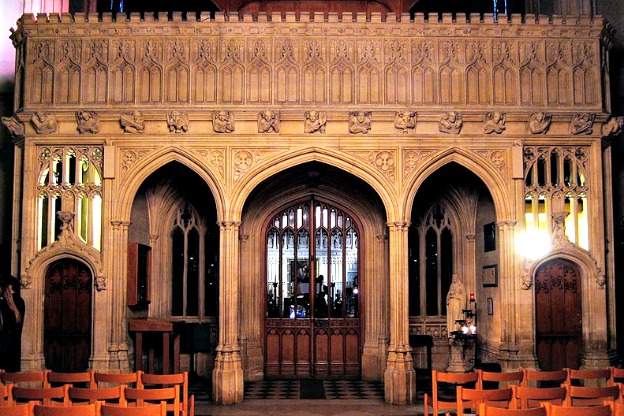
A 2014 Linn records release of the viol consort Phantasm and the Choir of Magdalen College, Oxford, is dedicated to the music of John Ward and his compositions for voices and viols. Included are Ward’s four-part viol fantasies (Phantasm has already previously recorded Ward’s five- and six-part consort works) as well as John Ward's verse anthems.
John Ward
John Wards bio is a little iffy. The English composer lived from maybe 1571 to possibly 1617, but since documents from 1638 still appear to bear his signature, a more likely set of dates might be circa 1589 to about 1638.
What we do know of Ward was that as a boy, he was a cathedral chorister and then a King's Scholar of the grammar school at Canterbury. After school, Ward took up with a Sir Fanshawe, Remembrancer of the Exchequer in London. Ward’s patron was a great music lover and supporter of the arts, and in his household, Ward’s musical abilities were nourished. During the course of his lifetime, Ward composed madrigals, sacred music both a capella and with instrumental accompaniment, and a lot of music for the viol consort.
The verse anthems and viol fantasies on this recording were likely composed sometime between 1609 and 1616. And it was during this period of time, that Henry Frederick Stuart, the well-loved and much anticipated heir to the throne, became Prince of Wales. Ward’s anthem, This is a Joyful Day was likely written on the festive occasion of Henry’s investiture in 1610, though it’s also possible that it could have been written for his younger brother Charles a few years later in 1616.
Ward composed verse anthems with viols that contrast solo voices with a full choir. In the liner note, the verse anthem is described as an “inspired fusion of the polyphonic liturgical anthem, the anglicized Italian madrigal style and the native viol fantasy.” In this particular anthem, the text invites all ‘to sing in consort with sweet harmony of instruments and voices.'
As a young man, Prince Henry had a brief stint at Magdalen College-how appropriate then that this recording features the present members of the Magdalen choir.
Besides the commemorative work for the Prince, others on the disc are composed on the Psalms or additional devotional texts. And Ward’s verse anthems, much like Italian madrigals of the time, employ extensive text-setting, or musical word-painting in which the music itself mimics the literal meaning of the words.
The six-part Praise the Lord, O my soul-a setting of Psalm 104 reconstructs the Genesis creation story. Rumbling basses singing the words: “at the voice of thy thunder they are afraid. The section that follows is a stark contrast as treble voices rise interval upon interval with the text: ‘They go up, as high as the hills…” The basses return though with descending figures when the Psalm reads, “and down to the valleys beneath.'
Four-part Viol Fantasies
Ward’s viol music, from his unassuming ayres for two viols to his sophisticated six-part fantasias, survive in quite a number of 17th-century music sources suggesting that Ward's compositions were widely appreciated during his lifetime.
In a 1658 letter, Dudley, Baron North of Kirtling, mentioned Ward and the C major Fantasy no. 6. The Baron described the piece as ‘brisk, lusty, yet mellifluent,” a piece that “stirs our bloud, and raises our spirits, with liveliness and activity, to satisfie both quickness of heart and hand.”









